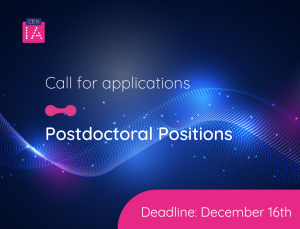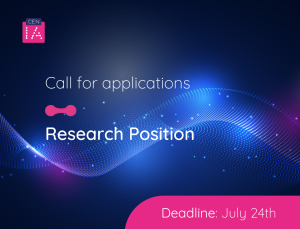
With the participation of more than 100 people gathered in the Aula Magna of Universidad Técnica Federico Santa María (USM), Cenia, the basal center of excellence, celebrated its first anniversary last Thursday, January 12. The event was attended by university authorities, academics, students and government authorities, among them, the Minister of Science, Technology, Knowledge and Innovation, Dr. Silvia Díaz, and the outstanding participation of researcher René Vidal, internationally recognized for his studies to understand the decisions made by algorithms and artificial intelligence applied to medicine, who was invited to present a keynote lecture on the present and future of AI.
Dr. Andrés Fuentes, Academic Vice Rector of Universidad Técnica Federico Santa María, welcomed the participants and emphasized the importance of participating in this type of event: “it demonstrates that collaboration between universities and the industry is key for the development of solutions that emerge from the local level and generate a global impact.” USM is one of Cenia’s four founding universities, along with Pontificia Universidad Católica de Chile, Universidad de Chile and Universidad Adolfo Ibáñez.

Cenia’s director, Dr. Álvaro Soto, briefly presented a pioneering project led by the National Center for Artificial Intelligence: the development of the first artificial intelligence index for Latin America, which will be launched at the beginning of the second half of 2023. It is a diagnostic tool that will allow to understand the state of the art, measure the progress of this technology and know the perception of society regarding AI in Chile and Latin America. Various multilateral organizations such as UNESCO, the Organization of American States (OAS), the Development Bank of Latin America (CAF), and leading multinational companies have joined this initiative.

Meanwhile, the Minister of Science, Technology, Knowledge and Innovation, Dr. Silvia Díaz, talked about to the current and potential benefits of artificial intelligence and the National AI Policy published in 2021, with which Chile became one of the 60 countries that have developed public policy initiatives to promote, guide and regulate the development of this technology. “Beyond the relevance of the Policy, we cannot remain only in statements, we must take concrete actions to enhance our national capabilities in artificial intelligence, and that is why we are here, on the anniversary of the National Center for Artificial Intelligence (…) who must be a fundamental tool of our contribution as a country to this global challenge.”

Dr. René Vidal, academic at Johns Hopkins University, University of Pennsylvania and Amazon researcher, was in charge of closing the ceremony with a keynote speech on the potential impact of artificial intelligence in medicine, an area in which the researcher has dedicated several years during his work at Johns Hopkins University.
Vidal took the opportunity to address a few words to the government authorities, universities and the director of Cenia: “I would like to congratulate the government authorities for having had the vision to invest in artificial intelligence through the Cenia project, congratulate the group of four universities that launched an extraordinary project with top researchers, both in the country and internationally, and in particular congratulate Professor Álvaro Soto for being the leader of this initiative and for the enormous progress they have made in the first year.”

A year to celebrate and define new challenges
Cenia celebrates its first year with important advances in research and development, strategic alliances, human capital formation and promotion of AI at the service of people. To date, the center has signed partnerships with nine universities and ten local companies, has more than one hundred high-level scientific publications and almost a dozen collaborative projects in both the public and private sectors.
In recent weeks, Cenia signed an agreement with venture capital firm Austral Capital to create an early-stage Venture Capital Fund, which will invest in startups with artificial intelligence as an enabling technology, and is expected to start operating in mid-2023. “Our commitment is to transform Chile into a relevant actor in this new technological revolution, but not in any way, but by promoting progress that puts technology at the service of people, that promotes a comprehensive and inclusive welfare, in order to build a more prosperous, happier and more inclusive country,” Cenia’s director, Álvaro Soto, added.
The event was attended by representatives of Austral Capital, AC3E, Flow Partners, Fundación Tremendas, Chilean Association of Women in Artificial Intelligence, BIRS, Zenta Group, Falabella, Unesco, Universidad San Sebastián, Artificial Intelligence Millennium Nucleus, Inspiring Girls Foundation, Universidad Técnica Federico Santa María, Entel, PAIR Nucleus, Fundación Kiri, Niñas Pro, Universidad de O’Higgins, Instituto Milenio Fundamentos de los Datos, Universidad de Chile, Futuristas, Sociedad de Fomento Fabril, Conecta Logística, Asociación Chilena de Seguridad, Ministerio de Educación, Technovation Girls, Agencia Nacional de Investigación y Desarrollo, Departamento de Ciencias de la Computación UC, CETI UC, Fundación Kodea, Instituto Milenio iHealth, APEC, Universidad Adolfo Ibáñez, Universidad de Chile’s Data and Artificial Intelligence Initiative, AWS, Gobierno Digital, and Senator Francisco Chahuán and former Minister of Science Andrés Couve.
Check the anniversary photo album here
By: Gianyser González, Cenia.







